 Petzlover
Petzlover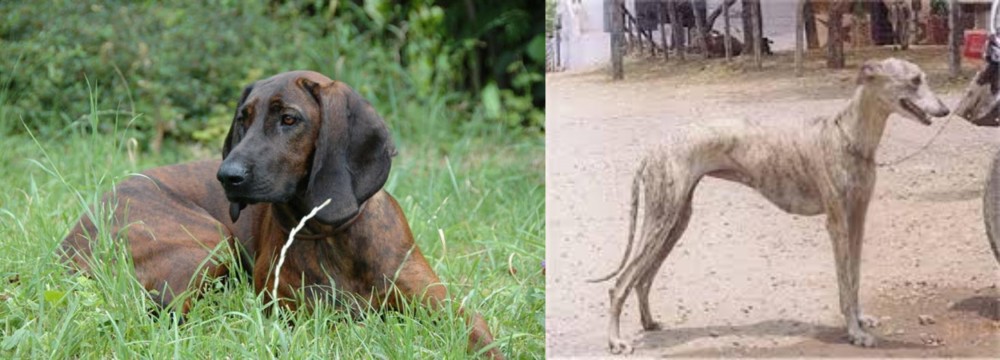 Hanover Hound is originated from Germany but Rampur Greyhound is originated from India. Hanover Hound may grow 20 cm / 7 inches shorter than Rampur Greyhound. Hanover Hound may weigh 23 kg / 51 pounds more than Rampur Greyhound. Both Hanover Hound and Rampur Greyhound has same life span. Both Hanover Hound and Rampur Greyhound has almost same litter size. Both Hanover Hound and Rampur Greyhound requires Low Maintenance.
Hanover Hound is originated from Germany but Rampur Greyhound is originated from India. Hanover Hound may grow 20 cm / 7 inches shorter than Rampur Greyhound. Hanover Hound may weigh 23 kg / 51 pounds more than Rampur Greyhound. Both Hanover Hound and Rampur Greyhound has same life span. Both Hanover Hound and Rampur Greyhound has almost same litter size. Both Hanover Hound and Rampur Greyhound requires Low Maintenance.
 Sometimes referred to as a Hanoverian Hound, this dog dates way back to the 17th century in Germany.
Sometimes referred to as a Hanoverian Hound, this dog dates way back to the 17th century in Germany.
This dog breed continues to be fairly rare today and has always been used as a hunting and tracking dog. It is believed the dog comes from bloodhounds dating back to medieval times. The dog isn’t recognized by the AKC but he is a member of the Scenthound group.
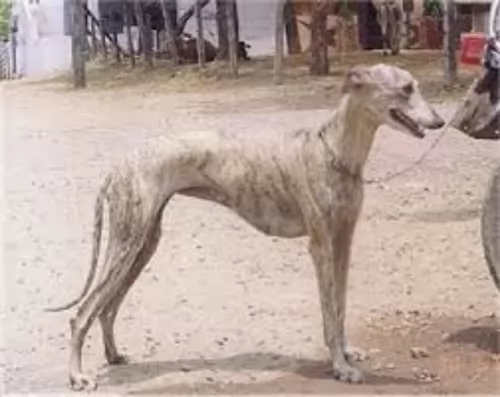 Known also as the North-Indian Greyhound or the Rampur Hound, the Rampur Greyhound is native to the Rampur area of Northern India.
Known also as the North-Indian Greyhound or the Rampur Hound, the Rampur Greyhound is native to the Rampur area of Northern India.
This dog is a member of the sighthound family, and in the past has been sought after for its efforts in controlling jackals.
The dog is also able to cover large distances at high speed. Some commemorative postage stamps were issued in 2005 as acknowledgement of this attractive dog breed.
 This is a sturdy, well built dog with a short, smooth, dense coat which is a reddish-brown color with brindling.
This is a sturdy, well built dog with a short, smooth, dense coat which is a reddish-brown color with brindling.
He is a well built, deep chested dog standing at about 50 – 55cm in height and weighing 48-53cm. He has the typical dark brown, soulful eyes of the Hound dog with long, broad, floppy ears.They usually have black noses, he has a deep chest, strong, straight legs and long, tapering tail.
Calm and gentle, the Hanover Hound is a loyal dog who bonds closely with his human family. When you socialize him he gets along well with children.
He is a hunting dog and loves nothing more than to be following some scent. You can call out his name, but he will not likely take notice, so determined is he to track down his prey, being known for his superb sense of smell.
His hunting instincts are strong and this means that you won't often find him being kept essentially as just a pet – they are first hunting dogs and then pets. Nonetheless, as already suggested, the Hanover Hound is more than capable of forming a strong bond with his human family, making a good family pet.
He is aloof and wary with strangers and this makes him a good watchdog. It is important to have him trained and socialized as then he becomes obedient and amicable when you need him to be like that around friends and family.
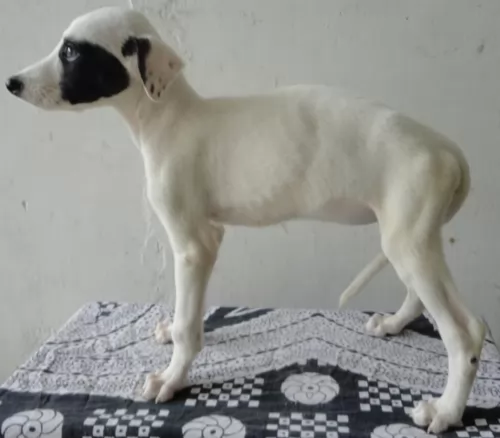 In height, the Rampur Greyhound stands at between 55 and 75 cm and they weigh in the region of 27 to 30kg.
In height, the Rampur Greyhound stands at between 55 and 75 cm and they weigh in the region of 27 to 30kg.
They are much the same as other greyhounds, but they’re somewhat wider and just a little bit more muscular. The head too, is broader than the slimmer head of the English Greyhound. Of course these dogs are known for the slim, pointed nose, the high-set ears which are sometimes half-floppy, half-erect. The eyes are large and the tail is long and slim.
The coat is short and smooth and is in colors such as gray, fawn, some white, some black with white and some brindle.
Your Rampur Greyhound is social around his human family, lapping up all their attention. He is the kind of dog that can be seen sprinting at high speed over the fields, but he is also not averse to lying peacefully with you on the sofa.
He is far better suited to a home with large gardens or on a farm as opposed to being confined to a small property in the city.
He can be gentle but when required, he becomes an excellent watchdog. He will need training and socialization as he can be rambunctious indoors, knocking things over. Training makes him obedient and restrained They get on well with children and other pets in the home.
 The Hanover Hound is an intelligent dog breed that responds well to training and socialization. They are dedicated hunting dogs but they are loyal and loving to their human family.
The Hanover Hound is an intelligent dog breed that responds well to training and socialization. They are dedicated hunting dogs but they are loyal and loving to their human family.
He will require an owner who is active and on the go while being firm and consistent with his treatment of him.
When socialized, he makes a good friend of children too. Keep him busy, exercise him, provide him with good food and consistent love and attention and he'll make you a devoted hunting companion and friend.
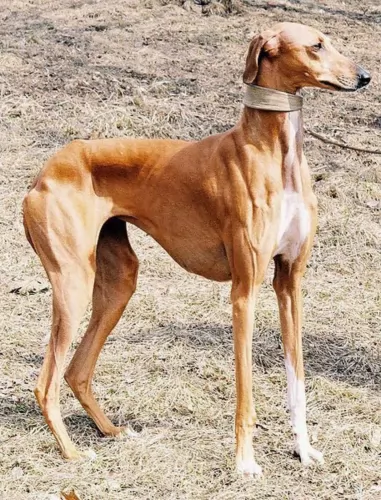 Everyone loves the Rampur Greyhound, and why not? He is fantastic with children because of his gentle, loving nature. He is a playful dog too and will require a daily dose of exercise.
Everyone loves the Rampur Greyhound, and why not? He is fantastic with children because of his gentle, loving nature. He is a playful dog too and will require a daily dose of exercise.
They aren’t noisy dogs, being naturally timid, but he still loves to get out and about with his daily walk to see and experience new sights and smells.
When you bring a Rampur Greyhound into your home, you’re bringing in a whole lot of wonderful companionship, love and loyalty from this remarkable canine.
 Capable of living to between 10 and 14 years of age, the Hanover Hound, like many other dogs, may well be prone to some of the more common dog illnesses there are.
Capable of living to between 10 and 14 years of age, the Hanover Hound, like many other dogs, may well be prone to some of the more common dog illnesses there are.
Because of his long, floppy ears, he will typically be more prone to developing otitis externa. This is why it is important to be checking your long, floppy-eared dog regularly and cleaning his ears to avoid wax- and dirt build-up and infection. Chronic ear infections will have to be treated by your vet.
You'll recognize the illness when you see your pet shaking his head often and scratching at his ears.
This is a genetic orthopedic disorder that affects many dogs and will eventually cause lameness. Hip dysplasia is due to malformed hip joints.
Eye diseases and problems with the eyelid can cause your pet a lot of discomfort as this is when an eyelid rolls in and then rubs against the eye.
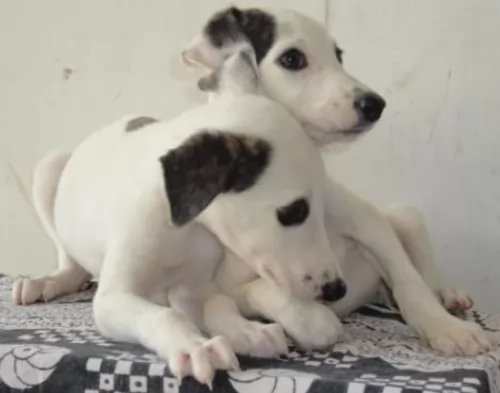 Rampur Hounds are generally a healthy dog breed, and their health is enhanced when you take good care of them and provide them with lots of love, good food and exercise.
Rampur Hounds are generally a healthy dog breed, and their health is enhanced when you take good care of them and provide them with lots of love, good food and exercise.
Still, every dog can fall prey to any one of the many dog illnesses there are such as cancer, bloat, diabetes, ear infections, epilepsy, obesity, eye problems and others.
This can be deadly for your dog. Gas collects in the stomach and the stomach can twist. You’ll notice your dog has a hard, swollen stomach and he is lethargic, but restless. Getting him to the vet as quickly as possible should be a top priority.
Your pet can develop all kinds of skin problems where he bites and scratches, causing bacteria. It can be terribly painful for your pet, and even ticks and fleas on the skin can cause cause a lot of irritation for your pet.
Some people add in omega 3 oils to their pet’s diet to help with dry skin. Don’t let your pet suffer with skin allergies and other problems that are itchy and painful. Get him to the vet so you can get to the root of what is causing him so much frustration with his skin.
 The Hanover Hound is a hunting breed so he won’t easily adapt to life in the city with a tiny garden. He will need a large garden or a farm to run around in.
The Hanover Hound is a hunting breed so he won’t easily adapt to life in the city with a tiny garden. He will need a large garden or a farm to run around in.
He is a hunting dog that loves to put his nose to the ground and to follow a scent. This is a dog breed which will need to be provided with a good amount of exercise every day to ensure his happiness and health.
As a large dog breed, you want to be sure to be feeding him a high quality food. It is always a good idea to add in some home-made food to his kibble. Read the packaging carefully of commercial manufactured dog foods and make sure you get food that is geared towards large, active breed dogs.
Add in cooked food such as cooked chicken, vegetables or brown rice and pasta and remember to include some raw meat into his diet from time to time.
Before dogs were domesticated they would eat raw meat as opposed to harmful grain based commercial dog foods of today. Benefits of adding in some raw meat from time to time include healthier skin, more energy and shinier coats and eyes. Make sure your pet has a constant supply of fresh, cool water.
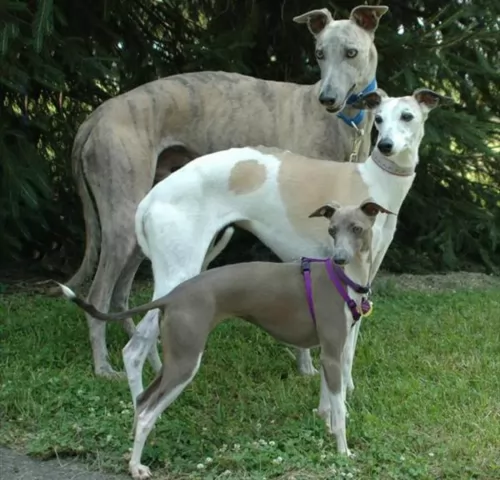 Active and playful, your Rampur Hound will need a lot of space to let off steam and run. He will look forward to his walks every day with you. Maybe you’ll need a tennis racquet to hit the ball far enough for him to sprint after.
Active and playful, your Rampur Hound will need a lot of space to let off steam and run. He will look forward to his walks every day with you. Maybe you’ll need a tennis racquet to hit the ball far enough for him to sprint after.
These dogs, with their short coats, are considered to be low maintenance, even though they do shed.
A good brush twice a week will do them good and they just love being massaged. It’s your time to run your hands over the slim, muscled body to make sure there are no unusual lumps on him.
Follow a regular grooming regime when you brush him. Check inside his ears, have a look at his eyes to make sure they’re still bright. Check inside his mouth for bad teeth which could be causing him terrible pain and make sure to trim his nails.
To be healthy and content, every dog needs good food.For convenience it can be great to feed your Greyhound one of the high quality commercially manufactured dog foods. To vary the food occasionally, add in some delicious home-made food too.
Once or twice a week you can simply add some home-made food to the dry kibble. Boiled chicken, brown rice or pasta and spinach, sweet potatoes and carrots are a healthy choice for your pet. Nothing complicated.
If you cook it in bulk, you can chop it all up and feed smaller portions to your pet. Some raw meat added in from time to time will also keep him healthy.
A simple meal like this will please your dog no end. No exotic spices and strange, weird kinds of food which could upset his stomach – just plain and simple the way dogs love it.
Ensure there is always a bowl of fresh, cool water within his reach.